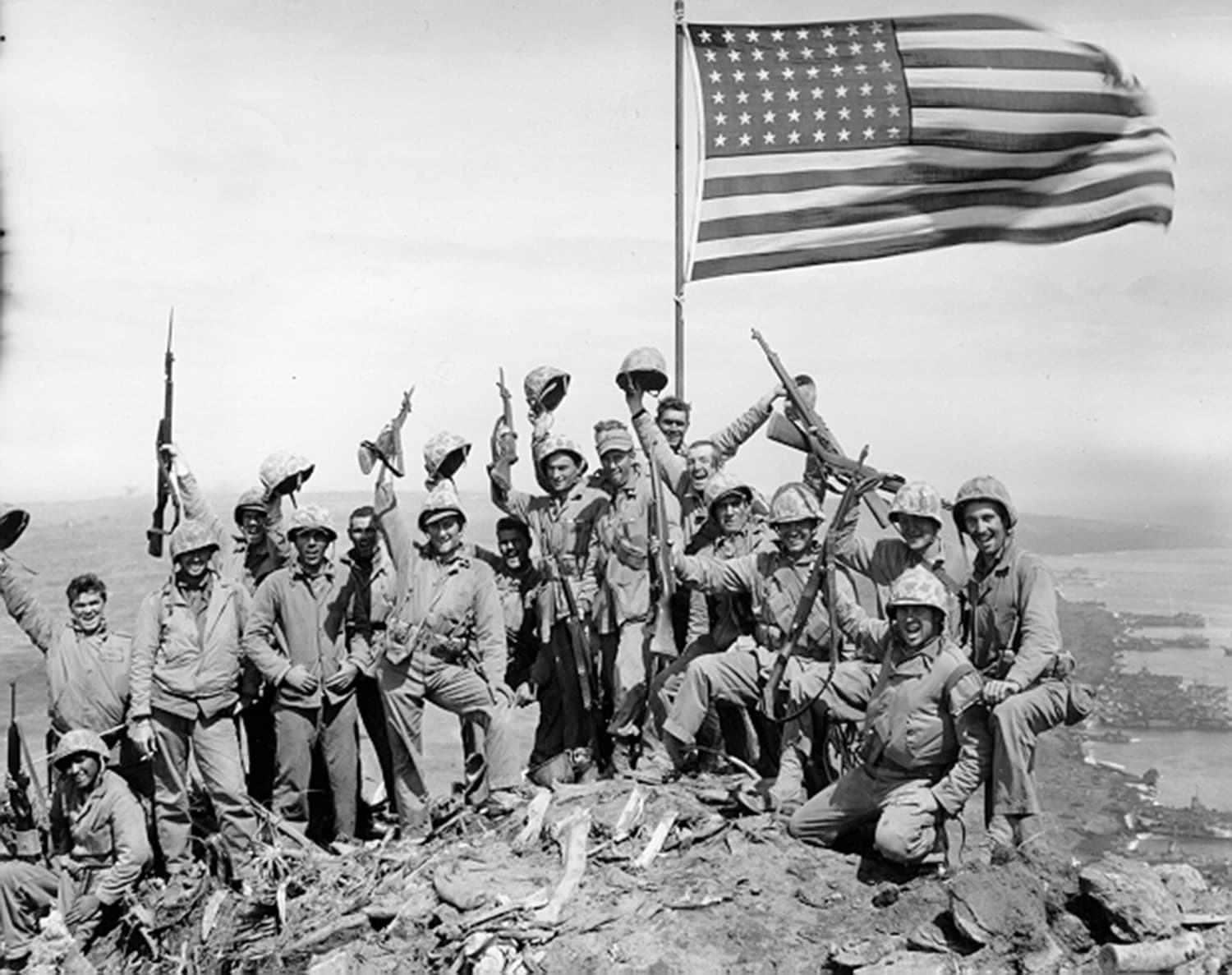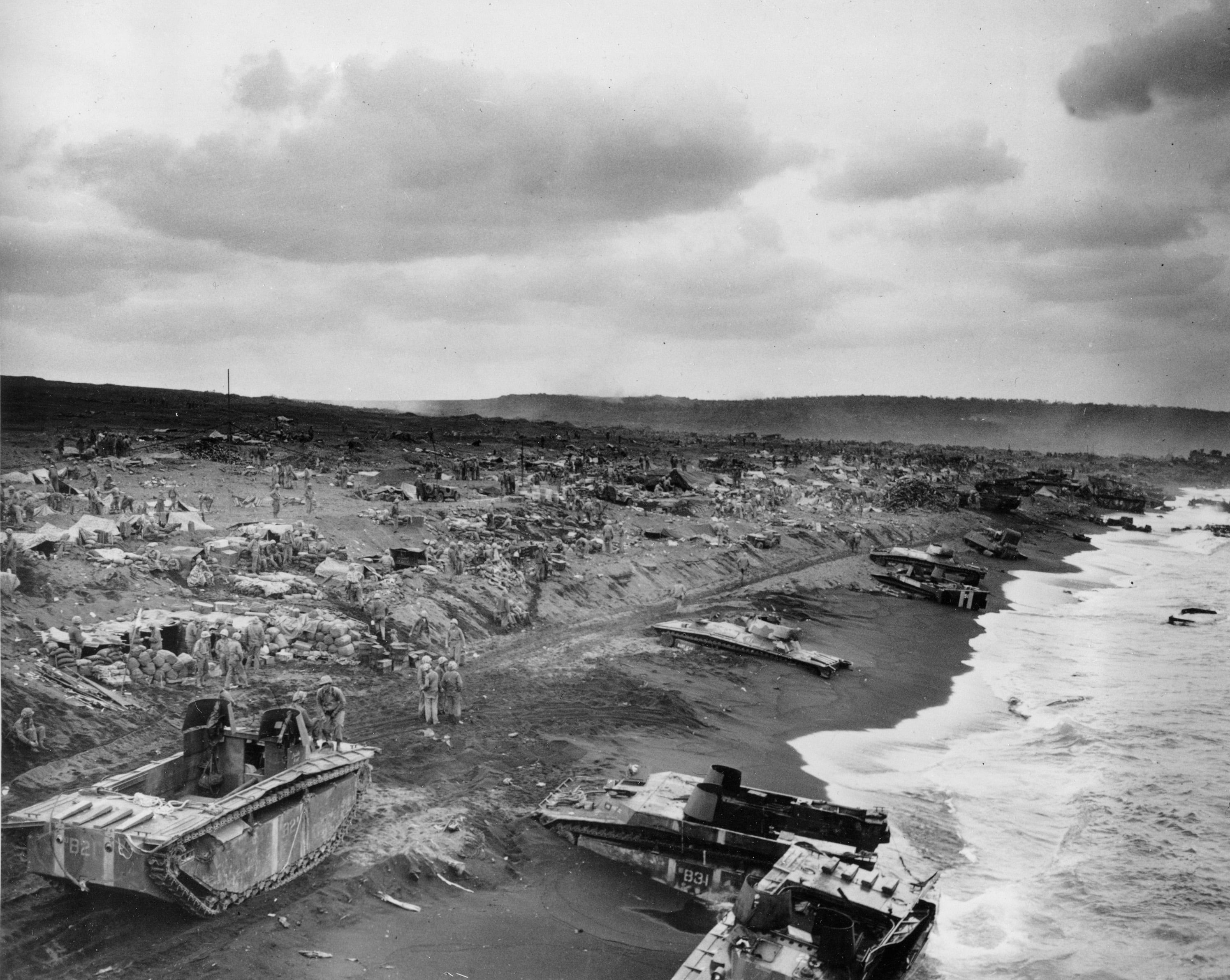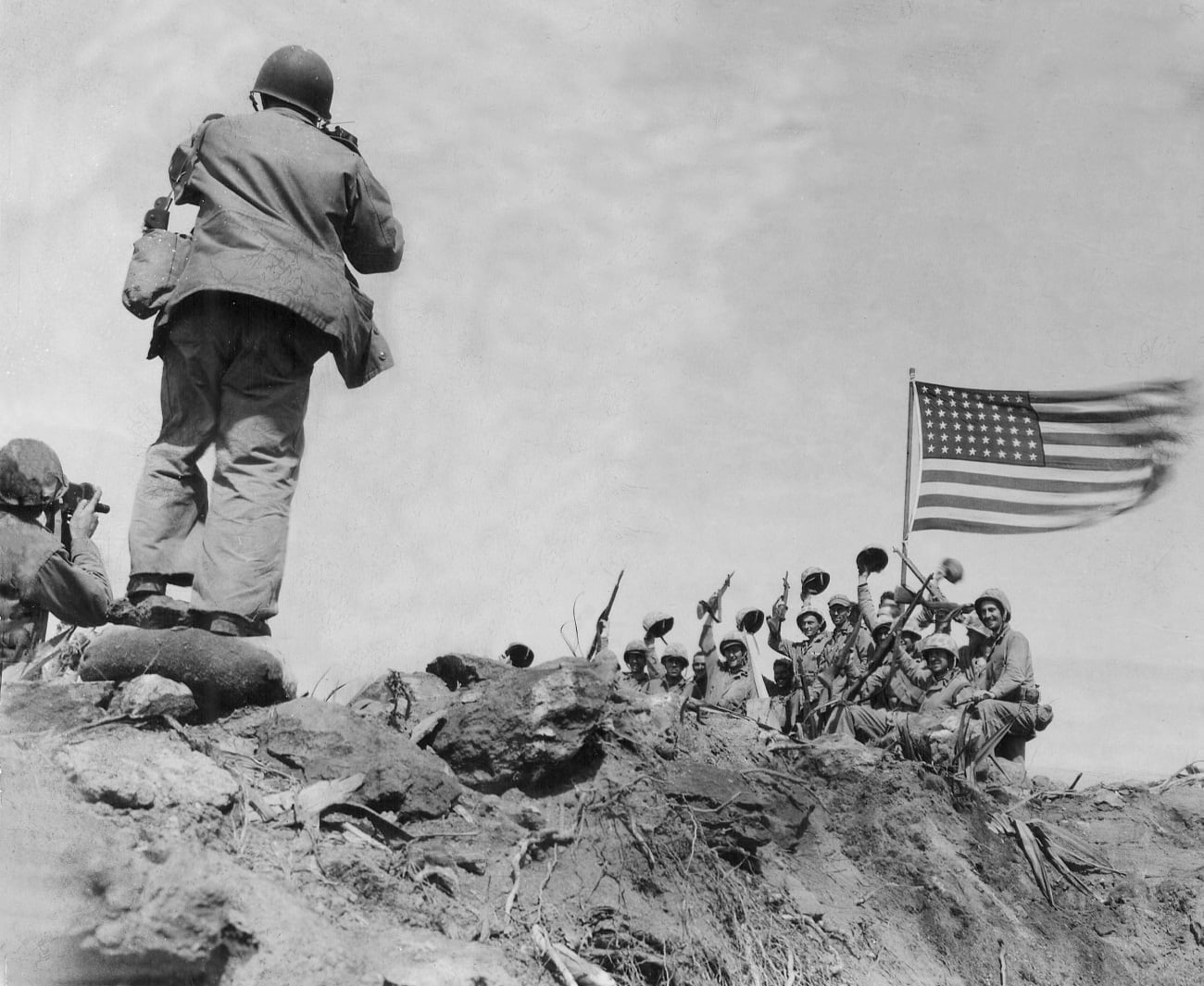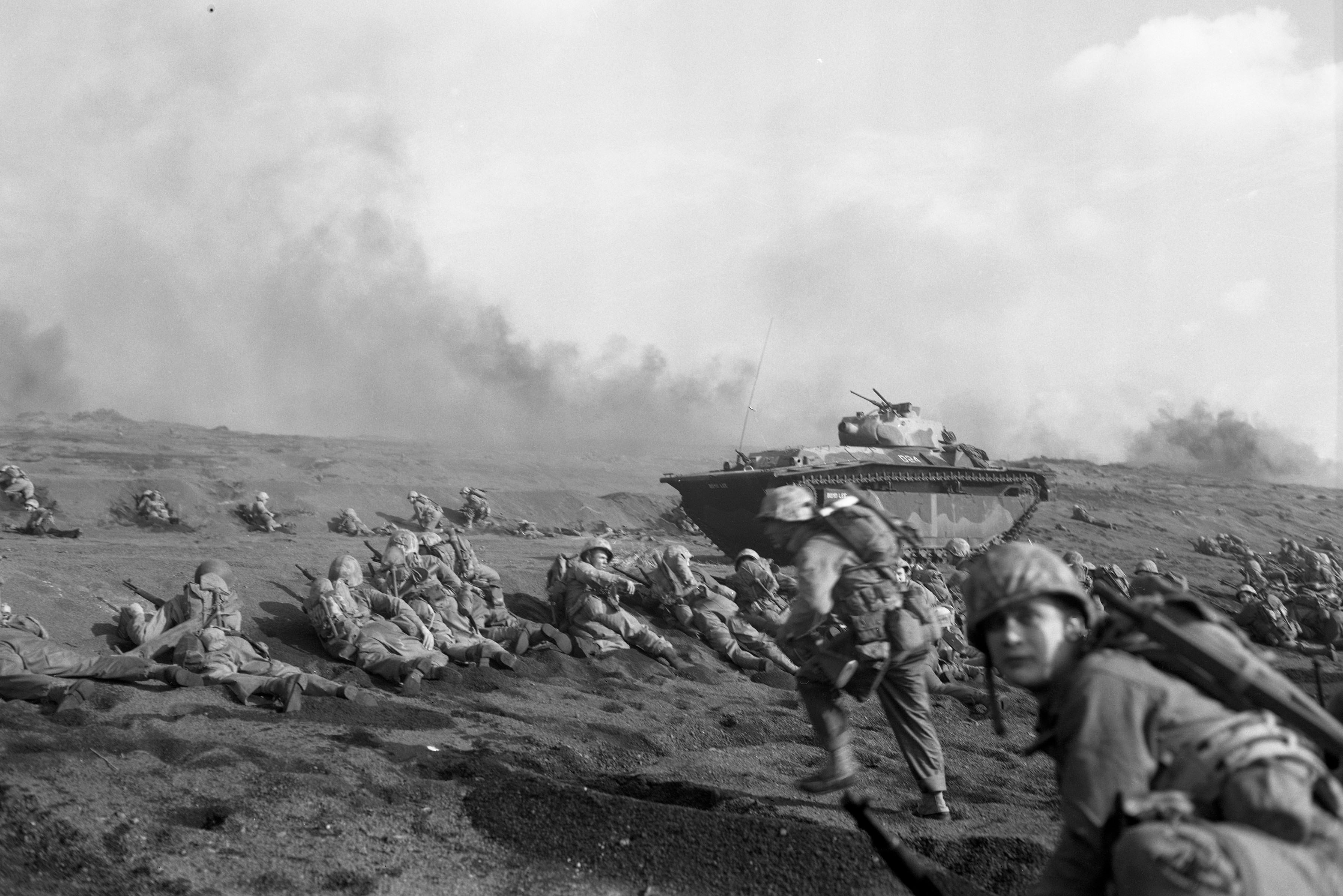
The Battle of Iwo Jima, fought between February 19 and March 26, 1945, remains one of the most iconic and brutal battles of World War II.
It marked a crucial turning point in the Pacific Theater, and the image of six U.S. Marines raising the American flag on Mount Suribachi has become one of the most enduring symbols of American valor, sacrifice, and resolve.
The battle itself, while a strategic victory, came at a heavy cost: more than 26,000 American casualties, including 6,800 killed in action, and nearly all of the Japanese defenders perishing.
But beyond the tactical importance of capturing the island, the battle and the famous flag-raising moment encapsulate the spirit of the American military during the war—a spirit that embodied courage, determination, and selflessness.
Iwo Jima, a small volcanic island located 660 miles south of Tokyo, was strategically important for the United States. The island’s two airfields would serve as crucial staging areas for the upcoming invasion of Japan's home islands.
The capture of Iwo Jima would also provide a critical location for American bombers to land in case of damage during bombing raids on the Japanese mainland.
However, the Japanese military understood the strategic importance of the island, and they fortified it heavily.
![USKINGS] Chúc mừng Iwo Jima Day - Ngày kỷ niệm một trong những chiến thắng oanh liệt nhất trong lịch sử Hoa Kỳ (19/02/2022) - HỘI KỶ LỤC GIA VIỆT NAM -](https://kyluc.vn/Userfiles/Upload/images/Iwo%20Jima%20Day.jpeg)
The island’s rugged terrain, the series of caves, bunkers, and tunnels that the Japanese had constructed, and the entrenched positions made it a formidable obstacle.
The battle began with a massive naval and aerial bombardment, intended to soften up the island’s defenses. However, the bombardment proved largely ineffective as many of the Japanese positions were dug deep into the island's volcanic rock.
When the U.S. Marines landed on Iwo Jima on February 19, they were met with fierce resistance. The Marines quickly realized that the battle would be a much tougher challenge than initially anticipated.
The Japanese defenders fought to the death, making the terrain treacherous and the enemy seemingly invincible. The Marines were forced to fight for every inch of the island, advancing slowly and suffering heavy casualties.
One of the most memorable moments of the battle occurred on February 23, 1945, when a group of U.S. Marines raised the American flag atop Mount Suribachi, a 550-foot volcanic peak that had been a strategic stronghold for the Japanese.
This moment, captured by Associated Press photographer Joe Rosenthal, has become one of the most iconic images of World War II, and perhaps one of the most recognized photographs in history.
The image of the six Marines hoisting the flag became a symbol of American perseverance, courage, and unity in the face of adversity.
It was not just a moment of triumph on the battlefield, but also a powerful symbol of hope for the American people and the Allies, who were still engaged in a hard-fought war across both the European and Pacific theaters.
However, the flag-raising at Iwo Jima was not the end of the battle. While the image of the flag flying over Mount Suribachi signified a turning point, the Marines still had to fight the Japanese defenders in other parts of the island.
The Japanese forces were well-entrenched, and the battle raged on for weeks. Even after the American flag was raised, the Japanese refused to surrender, and intense fighting continued until the last of the Japanese soldiers were either killed or captured. It wasn’t until March 26, 1945, that the island was fully secured.
The price of victory was steep. The United States suffered heavy losses, with 6,800 Marines killed and more than 19,000 wounded.
The Marines who fought at Iwo Jima knew they were going into a battle that would test their resolve like never before. They endured not only the physical hardships of the fight but the mental toll of knowing that many would not return.

But despite the brutality of the battle, the men of Iwo Jima demonstrated extraordinary bravery. Their courage and sacrifice allowed the United States to secure the island, providing a launching pad for future operations in the Pacific and bringing the war closer to its end.
The image of the flag-raising at Iwo Jima has since become a lasting symbol of American military sacrifice and heroism. It has been immortalized in statues, memorials, and even the Marine Corps War Memorial, which stands just outside the gates of Arlington National Cemetery.
The memorial features the famous image of the Marines raising the flag, with the words “Uncommon valor was a common virtue” inscribed beneath it.
This quote, taken from a speech by Admiral Chester W. Nimitz, reflects the immense bravery shown by the Marines at Iwo Jima.
It is a tribute to the men who fought, died, and lived through the horrors of the battle. The valor displayed by the Marines at Iwo Jima was truly uncommon, but it was a virtue shared by all who fought there.

The Battle of Iwo Jima and the flag-raising moment hold a special place in the hearts of many Americans, especially the veterans who fought there. For them, the image of the flag represents not just military victory, but the bond they shared with their comrades and the sacrifice made in the name of freedom.
It is a symbol of the American military’s commitment to protecting its values and its people, no matter the cost. The battle itself was a testament to the resilience of the American spirit, and the flag-raising captured that spirit in a way that no words could.
Iwo Jima also holds a broader significance in the context of World War II. The battle was a part of the larger strategy to defeat Japan and bring an end to the war.
After Iwo Jima was captured, the United States was able to use it as a base for bombing raids on Japan’s home islands. The island played a critical role in the final stages of the Pacific War, and its capture marked a step closer to victory.
However, the battle also revealed the high human cost of war. The Marines who fought at Iwo Jima paid with their lives, and their sacrifices should never be forgotten.
As we reflect on the Battle of Iwo Jima and the iconic flag-raising moment, we are reminded of the immense cost of freedom and the bravery that is required to defend it.

The sacrifices of the men who fought at Iwo Jima paved the way for the end of World War II and the eventual defeat of Japan.
Their courage and determination in the face of overwhelming odds embody the best of American ideals, and the flag raised on Mount Suribachi remains a powerful symbol of those ideals.
The Battle of Iwo Jima and the image of the flag-raising are a part of American history that will continue to inspire future generations.
The men who fought at Iwo Jima were ordinary Americans who rose to extraordinary circumstances. Their heroism, sacrifice, and unwavering commitment to their country and comrades are qualities that we continue to honor today.
As we look back on the Battle of Iwo Jima, we remember not just the military victory, but the courage and selflessness of the men who made that victory possible.
The flag-raising at Iwo Jima is a reminder of the cost of freedom, the value of sacrifice, and the power of the human spirit to overcome even the most daunting challenges.

-1750570235-q80.webp)
-1754623380-q80.webp)

-1749481098-q80.webp)